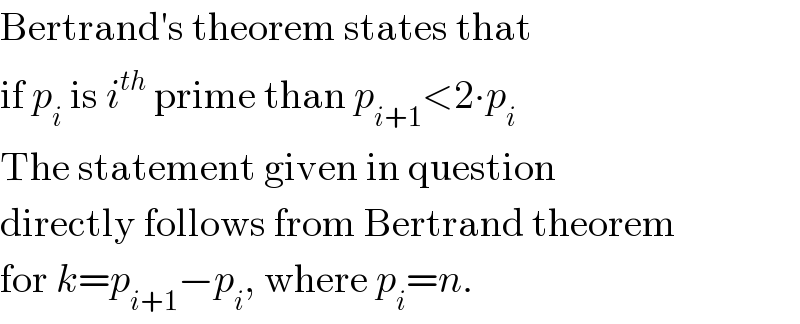
Question Number 503 by 123456 last updated on 20/Jan/15
![proof or given a counter−example: if n∈N,n>1, exist a number k∈N k∈(0,n] such that n+k is prime.](Q503.png)
$${proof}\:{or}\:{given}\:{a}\:{counter}−{example}: \\ $$ $${if}\:{n}\in\mathbb{N},{n}>\mathrm{1},\:{exist}\:{a}\:{number}\:{k}\in\mathbb{N} \\ $$ $${k}\in\left(\mathrm{0},{n}\right]\:{such}\:{that}\:{n}+{k}\:{is}\:{prime}. \\ $$
Commented byprakash jain last updated on 20/Jan/15

$$\mathrm{Bertrand}'\mathrm{s}\:\mathrm{theorem}\:\mathrm{states}\:\mathrm{that}\: \\ $$ $$\mathrm{if}\:{p}_{{i}} \:\mathrm{is}\:{i}^{{th}} \:\mathrm{prime}\:\mathrm{than}\:{p}_{{i}+\mathrm{1}} <\mathrm{2}\centerdot{p}_{{i}} \\ $$ $$\mathrm{The}\:\mathrm{statement}\:\mathrm{given}\:\mathrm{in}\:\mathrm{question} \\ $$ $$\mathrm{directly}\:\mathrm{follows}\:\mathrm{from}\:\mathrm{Bertrand}\:\mathrm{theorem} \\ $$ $$\mathrm{for}\:{k}={p}_{{i}+\mathrm{1}} −{p}_{{i}} ,\:\mathrm{where}\:{p}_{{i}} ={n}. \\ $$
